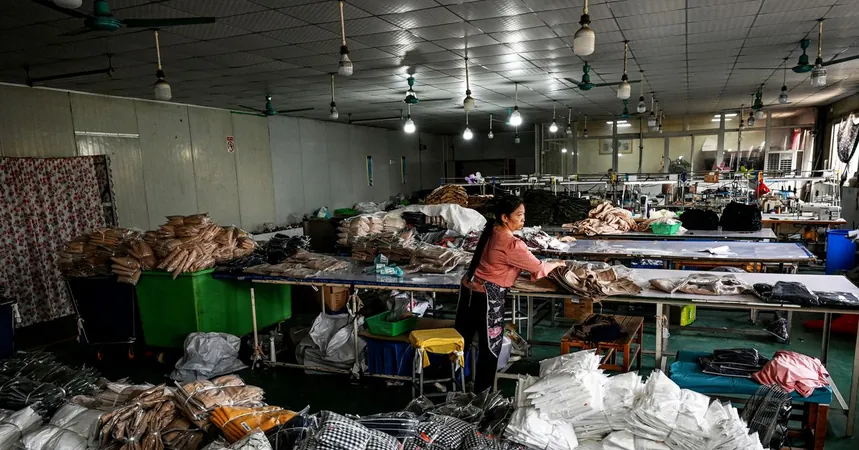
US Tariffs on Chinese Goods: What You Need to Know!
2025-05-03
Author: Liam
The End of Duty-Free Shipping from China
It's official—starting May 2, the age of duty-free small packages from China is over! This change, instigated by President Donald Trump's turbulent trade war, means that e-commerce giants like Temu, Shein, and AliExpress, as well as American heavyweights like Amazon, will now face tariffs up to a jaw-dropping 145% on goods valued under $800.
Retail Response: Price Hikes and Availability Issues
With the new tariff rules, retailers are scrambling. Shein announced price adjustments effective April 25, while Temu is now blocking US shoppers from viewing Chinese products. This move dramatically limits Americans’ choices as companies navigate adding tariff surcharges to online shopping carts.
Impact on American Consumers and Businesses
What does this mean for American consumers? Experts are voicing concerns that as tariffs take full effect, shipping volume at US ports is declining, potentially leading to shortages in stores as early as summer or fall. Retailers selling Christmas ornaments and toys are particularly anxious, with the holiday season just around the corner.
Will Chinese E-commerce Giants Abandon the US?
As the situation unfolds, companies like Temu, owned by Chinese titan Pinduoduo, are reconsidering their strategies. Although they've invested billions in attracting US consumers, the future remains uncertain. If the tariffs persist, would Temu withdraw entirely from the US market? For now, they're focusing on local products, but their long-term viability could be at stake.
The Ripple Effects of Tariffs on Supply Chains
Meanwhile, US businesses relying on Chinese imports are in a panic. Many lack the flexibility to shift their supply chains elsewhere, raising fears of inventory shortages affecting everything from local shops to major retailers by the end of the year.
Could Amazon Receive Special Treatment?
Could Trump offer special exemptions or subsidies to Amazon to cushion the blow from tariffs? Logistically, it's challenging because Amazon's marketplace features millions of independent sellers managing their own imports. Any benefits would have to account for this complexity.
Customs Preparedness Under Scrutiny
US Customs and Border Protection is already stretched thin as tariffs come into play. Just earlier this year, the US Postal Service briefly halted packages from China due to overwhelming demand. They will need to ramp up their capabilities to ensure compliance with the new regulations.
Factories Feeling the Squeeze
On the ground in China, factories are grappling with these tariffs, considering layoffs as they explore alternatives in less lucrative markets like Brazil and the EU—regions that simply don't have the same purchasing power as consumers in the US.
Who Stands to Gain?
In the midst of all this turmoil, some might wonder who actually benefits. While consumers may start reflecting on their buying habits due to higher prices, that poses a double-edged sword for the US economy. Any potential environmental gains may come at the cost of economic stability.
Tariff Evasion: The Risks of Third-Party Sales
Lastly, trading goods through intermediary countries to circumvent tariffs is illegal and could lead to severe fines if caught. As transparency becomes crucial, the impacts of these changes will resonate throughout the supply chain.
The bottom line: The end of the de minimis exemption marks a pivotal moment in US-China trade relations, leaving consumers and businesses to grapple with the impending consequences.









 Brasil (PT)
Brasil (PT)
 Canada (EN)
Canada (EN)
 Chile (ES)
Chile (ES)
 Česko (CS)
Česko (CS)
 대한민국 (KO)
대한민국 (KO)
 España (ES)
España (ES)
 France (FR)
France (FR)
 Hong Kong (EN)
Hong Kong (EN)
 Italia (IT)
Italia (IT)
 日本 (JA)
日本 (JA)
 Magyarország (HU)
Magyarország (HU)
 Norge (NO)
Norge (NO)
 Polska (PL)
Polska (PL)
 Schweiz (DE)
Schweiz (DE)
 Singapore (EN)
Singapore (EN)
 Sverige (SV)
Sverige (SV)
 Suomi (FI)
Suomi (FI)
 Türkiye (TR)
Türkiye (TR)
 الإمارات العربية المتحدة (AR)
الإمارات العربية المتحدة (AR)